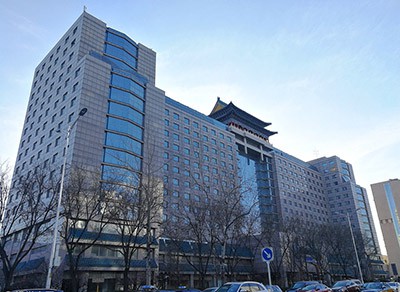
JD Group bought the Beijing Jade Palace Hotel for RMB 2.7 billion
Chinese e-commerce giant JD Group has bought an ageing landmark hotel in Beijing for RMB 2.68 billion ($396 million), with the world’s third-largest Internet firm saying that it plans to convert the facility for business and R&D use.
Beijing-based JD Group this month paid RMB 2.68 billion to purchase 100 percent of the equity in the Beijing Jade Palace Hotel from the Beijing Haidian State-owned Assets Operation & Management Center, as well as agreeing to take on RMB 762 million in debt associated with the 32-year-old project.
The purchase gives JD, which ranked behind only Amazon and Google parent firm Alphabet in terms of revenue among Internet firms in 2017, a new base to expand its business in a location just four kilometres south of its current technological center.
Making a Pricey Purchase in a Familiar Location
“For a rather old and money losing hotel asset, RMB 2.68 billion was quite a hefty price to pay,” Annie Wang, director of hotels at Savills Beijing, told Mingtiandi. “But for JD Group itself, this was a smart move. It’s necessary for the company to have a base in the heart of Beijing’s tech hub,” she added.
A JD Group spokesperson was cited in the local media as saying that the acquisition of the 411-room hotel, located at 76 Zhichun Lu in northwestern Beijing’s Haidian district was based on the company’s long term strategic development. In the future, JD said that the property located around six kilometres west of the capital’s Zhongguancun Science Park will be redeveloped to accommodate the company’s business operations as well as technological research and development. It will also act as a spatial medium for the company’s industrial development in the Haidian district.
“Haidian district has a concentration of resources and talents for innovation. JD Group hopes to count on Haidian’s location advantage, bring into full play JD’s leadership role in technological innovation and assist in building Haidian into a global center for innovation,” said China’s second largest online retailer.
Beijing-based JD currently has a campus in southeastern Beijing’s E-Town, about 42 kilometers from its latest acquisition. “The location of the Jade Palace Hotel, which is not only close to Zhongguancun but also to some of the best high education institutes including the Peking University and the Tsinghua University, gives JD a much easier access to the technological talent pool than its E-Town headquarters. It’s a win-win solution for every party involved,” Wang said.
JD Could Become a Commercial Landlord

JD boss Liu Qiangdong is building a new base in the Zhongguancun area
Wang noted that JD would likely demolish the vintage structure and rebuild a new one from scratch and could also take the opportunity to become a commercial landlord.
“It would not be too much of a surprise if JD decides to let some of the floors out,” Wang said. At the present, the Zhongguancuan area suffers from a shortage of quality office buildings, with office rents in the area averaging as much as RMB 300 per square meter per month, about 67 percent less than the capital’s Financial Street.
Located in the heart of China’s Silicon Valley and 200 meters from metro Line 10 Zhichunli station, the 18-storey Jade Palace Hotel was built in 1987 and opened for business since 1998. The 68,629 square meter (738,716 square foot) property comprised of a once five-star hotel, 9,000 square meter office spaces and retail elements.
Landmark Property Fails to Keep Pace
Thanks to its proximity to Zhongguancun, the hotel was regarded as a breeding ground for some of China’s most well-known tech companies including the smartphone maker Xiaomi and JD itself, who had either taken up office space at the building or regularly used the place for product launches and brainstorming sessions.
Despite all this love from the tech heavyweights, in 2013, the state-owned property, which had been losing out to a more competitive hotel industry, was stripped off its five-stars and since 2016, its operation has been suspended in the name of property renovation.
According to public records, as of September 30, 2018, the Jade Palace Hotel achieved annual sales revenue of RMB 18 million and suffered a net loss of RMB 47 million. The hotel had total assets of RMB 731 million and RMB 784 million in debt.
On November 26, 2018, the Beijing Haidian State-owned Assets Operation & Management Center listed the Jade Palace Hotel for sale on the Beijing Equity Exchange. The asset’s reserve price of RMB 2.68 billion included 100 percent equity for RMB 1.9 billion and RMB 762 million debt. The then owner of the hotel specified that interested parties must be of a high-tech nature with net assets in 2017 of no less than RMB 5 billion. The Beijing Haidian State-owned Assets Operation & Management Center had taken over the hotel property from the government-backed Beijing Capital Group in January 2018.
In 2017 JD Group beat out China Resources Land to win two commercial land parcels in Beijing E-Town, where its headquarters is located, for RMB 3.85 billion. The online retailer has also been expanding its dominance of China’s e-commerce into the country’s offline retail market. The company announced last September that it plans to open 1,000 app-enabled grocery showrooms in the next three to five years, stepping up its competition with Alibaba and Tencent for the mainland’s grocery business.
Leave a Reply